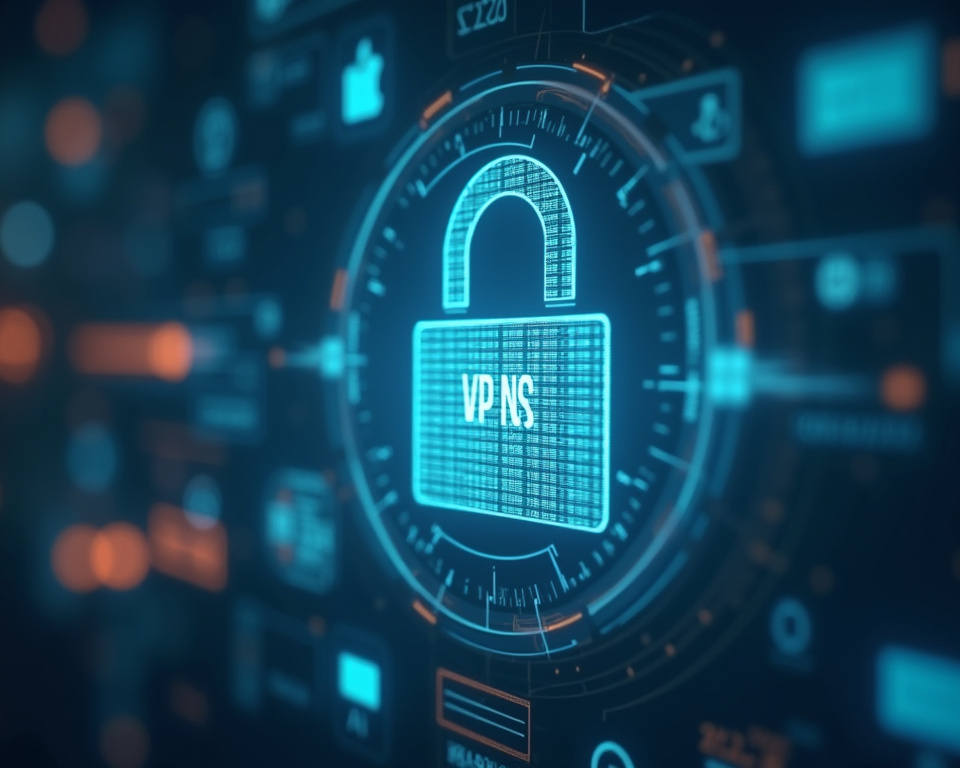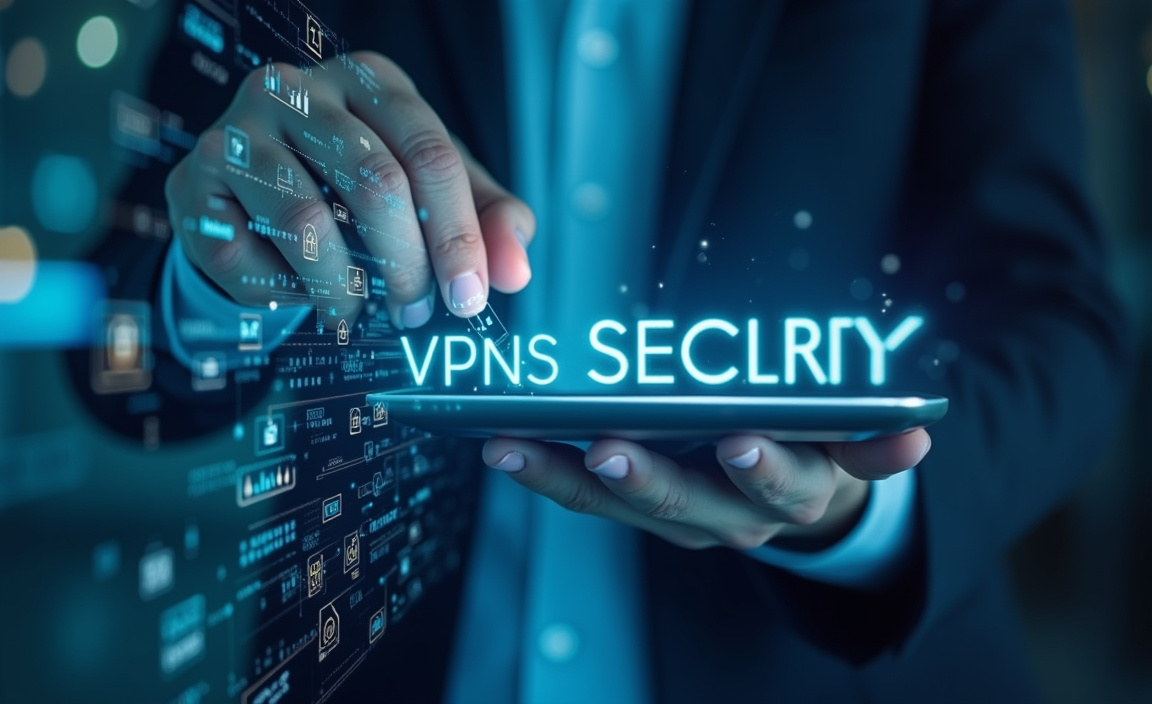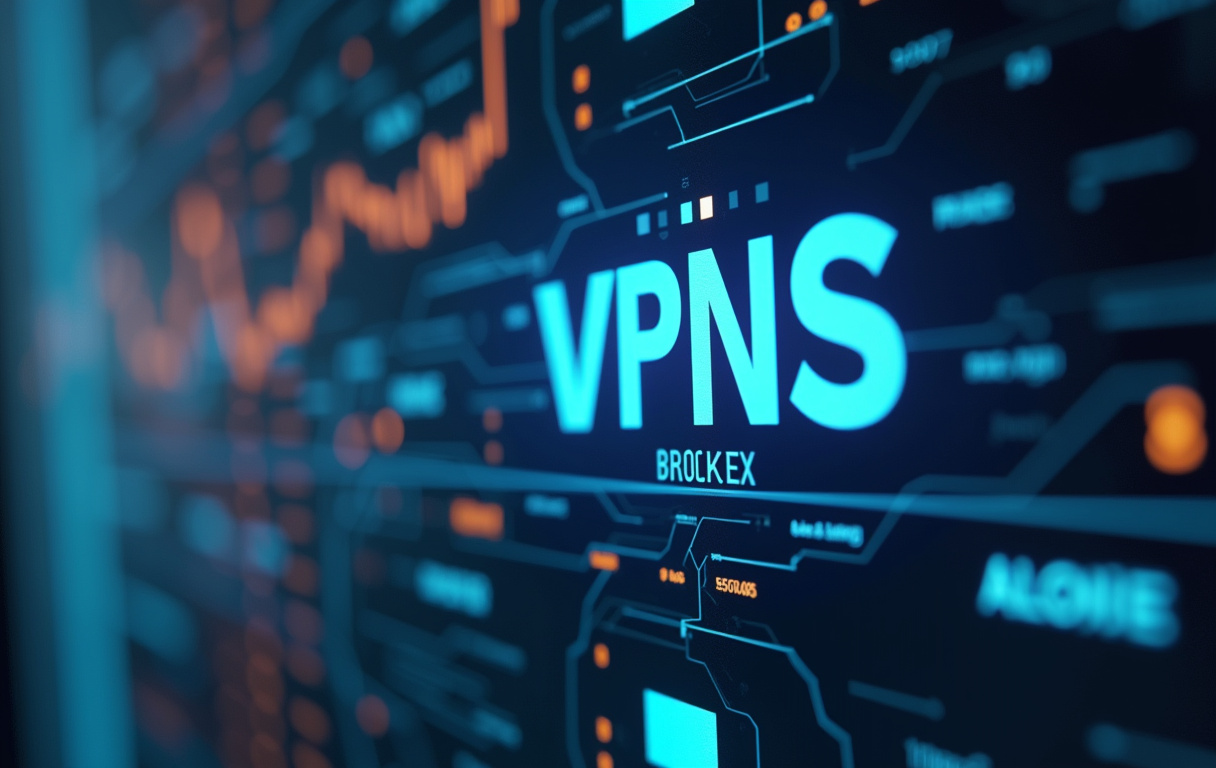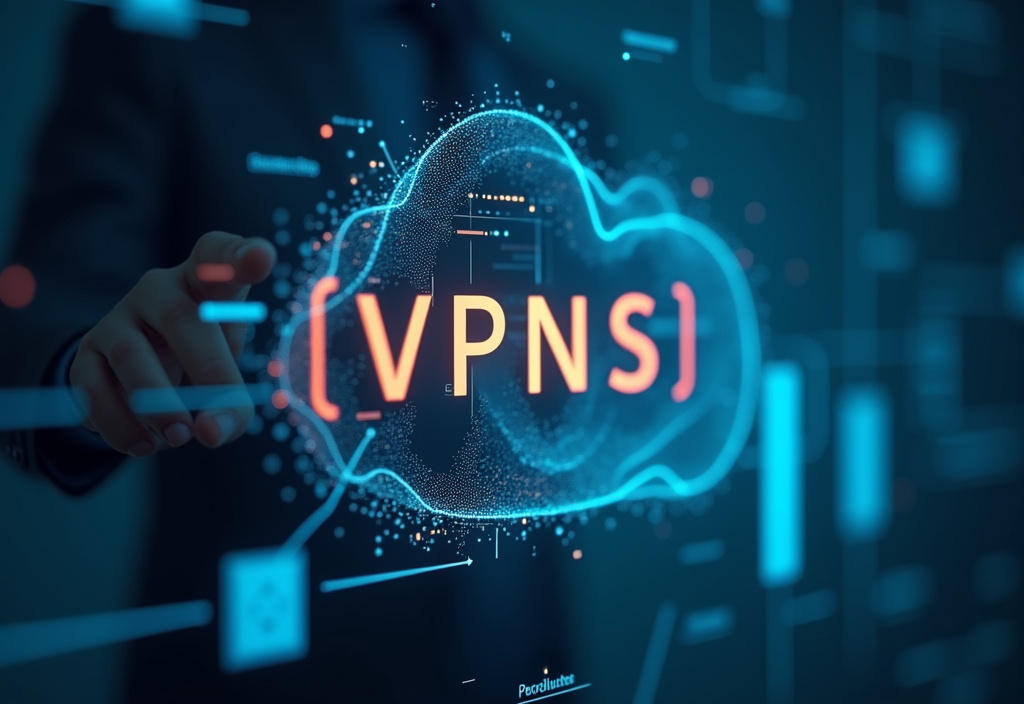VPNs for Finance Professionals: Secure Financial Data
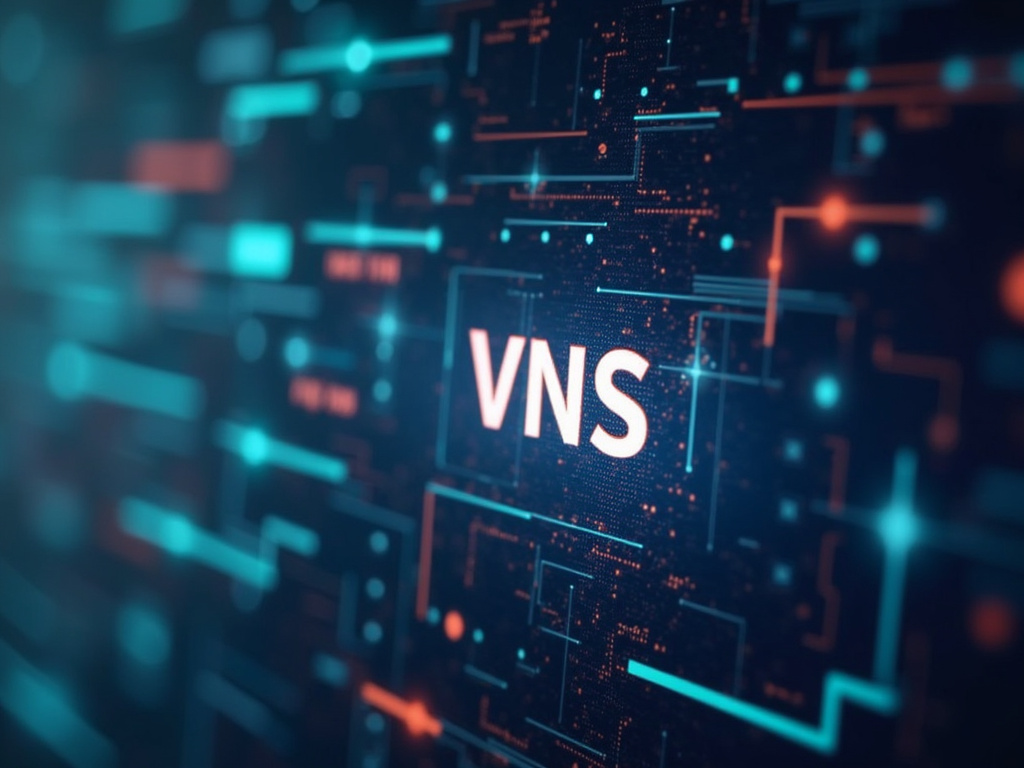
Table of Contents
- Protecting Financial Assets: An Introduction to VPNs
- Key VPN Protocols for Enhanced Data Security
- Choosing a Reputable VPN Provider: Due Diligence and Security Practices
- VPNs for Services: Enhancing Security and Privacy on Online Platforms
- The Future of VPNs: AI-Powered Security and Seamless Integration
Protecting Financial Assets: An Introduction to VPNs
In the high-stakes world of finance, where fortunes are made and lost on the turn of a dime, data security isn't just a best practice—it's a fundamental necessity. Finance professionals, entrusted with sensitive client information, trading strategies, and confidential company data, are prime targets for cyberattacks. A single breach can lead to devastating financial losses, reputational damage, and legal repercussions.
The increasing sophistication of cyber threats demands proactive and robust security measures. One such measure, rapidly gaining traction among discerning finance professionals, is the implementation of a Virtual Private Network (VPN). This article delves into the critical role of VPNs in safeguarding financial data, exploring how they bolster 'data protection' and ensure 'secure transactions.' We will examine the unique security challenges faced by finance professionals and how a well-chosen 'finance VPN' can mitigate these risks, contributing significantly to overall 'financial security'.
The piece will serve as a guide for finance professionals seeking to understand the benefits of using a 'VPN for finance' and how to select a VPN that meets their specific needs. The need for robust data security in the financial sector arises from the sheer value and sensitivity of the information handled. Financial institutions and professionals deal with vast quantities of personally identifiable information (PII), including bank account details, credit card numbers, social security numbers, and investment portfolios.
This data is highly lucrative for cybercriminals, who can use it for identity theft, fraud, and other malicious purposes. Furthermore, financial institutions are often subject to strict regulatory requirements, such as the Gramm-Leach-Bliley Act (GLBA) and the Payment Card Industry Data Security Standard (PCI DSS), which mandate specific security measures to protect customer data. Failure to comply with these regulations can result in hefty fines and legal action.
Given the high stakes involved, finance professionals must take a proactive approach to data security, implementing robust measures to protect sensitive information from unauthorized access. One of the most effective ways to achieve this is by using a Virtual Private Network (VPN). A VPN creates a secure and encrypted connection between a user's device and a remote server, effectively masking the user's IP address and encrypting all data transmitted over the internet.
This makes it exceedingly difficult for hackers to intercept or tamper with sensitive financial data. The benefits of using a 'finance VPN' extend beyond mere data encryption. VPNs can also help finance professionals bypass geographical restrictions, access geo-restricted content, and protect themselves from surveillance and censorship.
For example, a finance professional who is traveling abroad may need to access financial data or trading platforms that are only available in their home country. A VPN can allow them to bypass these geographical restrictions and access the necessary resources. Similarly, a finance professional who is working in a country with strict internet censorship may need to use a VPN to access financial news or research that is blocked by the government.
In addition to these practical benefits, VPNs can also provide finance professionals with a greater sense of privacy and security. By masking their IP address and encrypting their online activity, a VPN makes it more difficult for websites, online services, and third-party trackers to monitor their browsing habits and collect their personal data. This can be particularly important for finance professionals who need to maintain confidentiality and avoid being targeted by cybercriminals.
The implications of compromised financial data extend far beyond immediate monetary losses. They can erode client trust, tarnish a firm's reputation, and trigger regulatory investigations. Consequently, 'financial security' is not merely a technical concern; it's a strategic imperative that directly impacts a firm's long-term viability and success.
Choosing the right VPN is crucial, as not all VPNs are created equal. VPNs are not only about financial security, but they can secure other business data and ensure that customer information is secured, avoiding financial institutions facing legal and reputational backlash.
Key VPN Protocols for Enhanced Data Security
The core function of a VPN lies in establishing a secure and encrypted connection between a user's device and a remote server. This connection effectively creates a private tunnel through the public internet, shielding data from interception and tampering. When a finance professional accesses sensitive financial information through a VPN, all data transmitted between their device and the VPN server is encrypted using advanced cryptographic algorithms.
This encryption transforms the data into an unreadable format, making it virtually impossible for unauthorized individuals to decipher. Even if a hacker were to intercept the encrypted data, they would be unable to make sense of it without the decryption key. The level of encryption used by a VPN is a critical factor in determining its security.
Finance professionals should seek out VPNs that employ strong encryption protocols, such as AES-256 (Advanced Encryption Standard) or equivalent. These protocols are widely considered to be the gold standard in encryption, providing a high level of security against brute-force attacks and other forms of decryption. In addition to encryption, VPNs also provide an added layer of anonymity by masking the user's IP address.
An IP address is a unique identifier assigned to every device connected to the internet. By masking the IP address, a VPN makes it difficult for websites, online services, and third-party trackers to identify and monitor the user's online activity. This is particularly important for finance professionals who need to maintain confidentiality and avoid being targeted by cybercriminals.
A 'finance VPN' server location plays a significant role in optimizing connection speed and accessing geo-restricted content. Finance professionals may need to access financial data or trading platforms located in specific countries. A VPN with servers in those countries will allow them to bypass geographical restrictions and access the necessary resources.
However, it's important to choose VPN servers that are located in countries with strong data privacy laws. This will help ensure that the user's data is protected from government surveillance and other forms of intrusion. It is best to consider a VPN that offers a wide range of server locations around the world.
This gives finance professionals the flexibility to choose the server location that best suits their needs, optimizing both security and performance. The ability to connect to servers in different countries can also be useful for testing trading strategies or accessing financial news from various sources. Many VPNs offer additional security features that can further enhance 'data protection' for finance professionals.
One such feature is a kill switch, which automatically disconnects the user from the internet if the VPN connection drops unexpectedly. This prevents unencrypted data from being transmitted over the public internet, protecting sensitive financial information from exposure. Another useful feature is DNS leak protection, which prevents the user's DNS queries from being leaked to their ISP.
DNS leaks can reveal the user's online activity to their ISP, even when they are connected to a VPN. DNS leak protection ensures that all DNS queries are routed through the VPN tunnel, preventing any sensitive information from being exposed.. For finance professionals regularly using public Wi-Fi networks, a VPN is essential for ensuring 'secure transactions'.
Public Wi-Fi hotspots are notoriously insecure, as they are often unencrypted and vulnerable to eavesdropping. A VPN encrypts all traffic passing through the network, rendering it unreadable to unauthorized parties. In order to have complete 'financial scurity', this ensures that sensitive financial data remains protected, regardless of the network being used.
The 'finance VPN' must have a strict no-logs policy in place, guaranteeing user activity is not recorded. A no-logs policy means that the VPN provider does not collect or store any information about the user's online activity, including their browsing history, IP address, and connection timestamps. This is crucial for finance professionals who need to maintain confidentiality and avoid being tracked by third parties.
Ensure you revise the location the VPN provider is located, avoiding countries with active surveillance laws with no individual data protection, this type of VPN do not provide complete data protection because the laws do not protect the user. A reliable VPN provider will have a no-logs policy in place, that ensures user activity is not recorded, therefore is a good starting point analyzing the provider you pretend to purchase.
Choosing a Reputable VPN Provider: Due Diligence and Security Practices
The establishment of robust security policies forms the bedrock of any effective 'data protection' strategy within the finance sector. These policies should not only encompass the technical aspects of VPN implementation but also address the human element, emphasizing employee education and awareness. A comprehensive security policy should clearly define acceptable usage guidelines for VPNs, outlining the specific types of data that should be protected and the situations in which a VPN should be used.
This policy should also address the potential risks associated with using VPNs, such as the possibility of malware infection or data breaches. VPN adoption across the organization is crucial for a holistic 'financial security' posture, where the entire organization leverages this security tool. Employee training is an essential component of any successful VPN implementation.
Finance professionals need to be educated about the importance of data security and the role that VPNs play in protecting sensitive information. Training programs should cover topics such as how to use a VPN correctly, how to identify and avoid phishing scams, and how to report security incidents. Regular refresher courses should be conducted to reinforce these concepts and ensure that employees stay up-to-date on the latest security threats.
In addition to training, organizations should also implement clear and concise security policies that outline the rules and responsibilities of employees when it comes to data protection. These policies should cover topics such as password management, data storage, and data transmission. Employees should be required to acknowledge and adhere to these policies as a condition of employment.
A well-defined incident response plan is also crucial for 'financial security'. In the event of a data breach or security incident, organizations need to have a plan in place to quickly and effectively contain the damage and restore normal operations. This plan should include procedures for identifying the source of the breach, isolating affected systems, notifying relevant stakeholders, and implementing corrective actions.
The incident response plan should be regularly tested and updated to ensure that it remains effective in the face of evolving threats. Regular security audits are also essential for maintaining a strong security posture. Security audits involve a comprehensive assessment of an organization's security controls to identify vulnerabilities and weaknesses.
These audits should be conducted by independent security experts who can provide unbiased recommendations for improvement. The results of security audits should be carefully reviewed and acted upon to address any identified vulnerabilities. 'Secure transactions' rely heavily on consistent VPN usage and adherence to organizational security protocols.
Finance professionals should always use a VPN when accessing sensitive financial data, regardless of whether they are working from the office, from home, or on the road. They should also be mindful of the security of the networks they are using. Public Wi-Fi hotspots should be avoided whenever possible, as they are often unencrypted and vulnerable to eavesdropping.
If a public Wi-Fi hotspot must be used, a VPN should always be enabled. Finance professionals should also be cautious about clicking on links or opening attachments in emails, as these could be phishing scams or malware. They should always verify the sender of an email before clicking on any links or opening any attachments.
Password management is also critical for 'financial security'. Finance professionals should use strong, unique passwords for all of their accounts, and they should never share their passwords with anyone. Password managers can be used to securely store and manage passwords.
By implementing robust security policies and providing comprehensive employee training, organizations can significantly reduce the risk of data breaches and security incidents. A well-chosen and properly implemented 'finance VPN', combined with a strong security culture, is essential for protecting sensitive financial data and maintaining the trust of clients and stakeholders. VPNs need to be configured properly and used the majority of time therefore the best policy is that its usage is mandatory.
VPNs for Services: Enhancing Security and Privacy on Online Platforms
When selecting a 'VPN for finance', it's crucial to prioritize features that align with the specific security needs of the financial sector. Not all VPNs are created equal, and a VPN designed for casual browsing might not offer the level of protection required for handling sensitive financial data. One of the primary considerations should be the strength of the encryption used by the VPN.
As mentioned earlier, AES-256 is widely regarded as the gold standard, providing robust protection against unauthorized access. Finance professionals should also look for VPNs that offer a variety of security protocols, such as OpenVPN, IKEv2/IPsec, and WireGuard. These protocols offer different tradeoffs between speed and security, allowing users to choose the protocol that best suits their needs.
A 'finance VPN' should have a kill switch feature, automatically disconnecting the user from the internet if the VPN connection drops unexpectedly. This prevents unencrypted data from being transmitted, protecting sensitive information from exposure. DNS leak protection is another essential feature, preventing the user's DNS queries from being leaked to their ISP.
This helps to maintain anonymity and prevent third parties from tracking the user's online activity. A strict no-logs policy is paramount when selecting a 'finance VPN'. The VPN provider should not collect or store any information about the user's online activity, including their browsing history, IP address, and connection timestamps.
This ensures that the user's data remains private and confidential. It's important to carefully review the VPN provider's privacy policy to ensure that it is clear, transparent, and comprehensive. The provider should also be located in a country with strong data privacy laws, as this can help to protect the user's data from government surveillance.
Server location is another important factor to consider. Finance professionals may need to access financial data or trading platforms located in specific countries. A VPN with servers in those countries will allow them to bypass geographical restrictions and access the necessary resources.
However, it's also important to choose VPN servers that are located in countries with strong data privacy laws. This will help ensure that the user's data is protected from government surveillance and other forms of intrusion. VPN performance is also a critical consideration.
A slow or unreliable VPN can negatively impact productivity and hinder the ability to conduct 'secure transactions'. Finance professionals should look for VPNs that offer fast connection speeds and reliable performance. They can also test the performance of a VPN by using online speed testing tools.
The VPN should be compatible with the various devices and platforms used by finance professionals, including desktop computers, laptops, smartphones, and tablets. The integration should be seamless and intuitive, minimizing disruption to workflow and maximizing user adoption. A good VPN provider will offer customer support, assistance in setting up the system, troubleshooting and addressing user queries.
VPNs can at times present some technical issues and require expert asistance. The user interface of the VPN app or software should be user-friendly and easy to navigate. Finance professionals should be able to quickly and easily connect to a VPN server, change settings, and access other features.
A complex or clunky user interface can be frustrating and time-consuming to use. A comprehensive understanding of how the features integrate and the overall impact on workflow is critical. In order to ensure 'data protection' and 'financial security' the cost-effectiveness of the VPN should be assessed.
Finance professionals should look for VPNs that offer a range of pricing plans to suit different needs and budgets. They should also be aware of any hidden fees or charges. Cheaper VPNs do not guarantee complete protection and a high level of encrypted data.
A free VPN is less recommendable than a paid one, as sometimes free VPNs could be selling information. Therefore investing a higher amount in the tool will avoid additional risks. A VPN must show all guarantees to ensure customer the 'data protection' to be used and should be considered as an expense for the financial professional or enterprise.
The Future of VPNs: AI-Powered Security and Seamless Integration
The financial industry operates in a constantly evolving threat landscape, requiring continuous adaptation and vigilance in cybersecurity practices. The integration of a 'finance VPN' represents a crucial step in 'data protection', but it's not a silver bullet. Finance professionals must remain informed about emerging threats and proactively adapt their security measures to stay ahead of cybercriminals.
Regular security assessments and penetration testing are essential for identifying vulnerabilities and weaknesses in an organization's security posture. These assessments should be conducted by independent security experts who can provide unbiased recommendations for improvement. The results of these assessments should be carefully reviewed and acted upon to address any identified vulnerabilities.
Staying informed about the latest security threats and vulnerabilities is also crucial. Finance professionals should subscribe to security newsletters, follow security experts on social media, and attend security conferences to stay up-to-date on the latest trends and best practices. They should also be aware of the latest phishing scams and other social engineering tactics used by cybercriminals.
In addition to staying informed, finance professionals must also proactively adapt their security measures to address emerging threats. This may involve implementing new security technologies, updating existing security policies, or providing additional employee training. It's important to regularly review and update security policies to ensure that they remain effective in the face of evolving threats.
As the perimeter of financial networks expands with remote work and cloud adoption, traditional security measures may not be sufficient. Finance professionals should consider implementing a Zero Trust security model, which assumes that no user or device is trusted by default, regardless of whether they are inside or outside the network perimeter. A VPN can be a component of a remote access zero trust network.
Another factor when considering 'VPN for finance' is the rise of mobile devices and an ever increasing need of remote work. The widespread use of mobile devices in the finance sector presents unique security challenges. Finance professionals often use their personal smartphones and tablets to access sensitive financial data, blurring the lines between personal and professional use.
It's important to implement mobile device management (MDM) policies to ensure that mobile devices used to access financial data are properly secured. These policies should cover topics such as password management, device encryption, and remote wiping. Cloud computing has also become increasingly prevalent in the finance sector, offering numerous benefits such as scalability, cost savings, and increased collaboration.
However, cloud computing also introduces new security risks. Finance professionals must ensure that their cloud providers have implemented robust the 'data protection' security measures to protect sensitive financial data stored in the cloud. They should also encrypt sensitive data both in transit and at rest.
The VPN has to be optimized and configured at the right security level, integrating tools of data analysis, protection and security that have the better reviews. In conclusion, the 'financial security' of financial data requires a multi-layered approach that encompasses strong encryption, strict no-logs policies, robust security policies, and proactive threat monitoring. A well-chosen 'finance VPN' is an essential component of this approach, providing a secure and encrypted connection for accessing sensitive financial data.
However, it's important to remember that a VPN is not a panacea. Finance professionals must remain vigilant and adapt their security measures to stay ahead of cybercriminals. By combining a strong security culture with the right security technologies, organizations in the finance sector can protect sensitive financial data and maintain the trust of their clients and stakeholders.
'Secure transactions' will be a consequence of the professional security practice. The implementation of a 'VPN for finance' is a strong measure to guarantee professional finance activities are well executed without the risk to have violations that jeopardize the data and the reliability of the financial business implemented.
Stay Updated
Get the latest VPN news, tips, and exclusive deals to your inbox.
